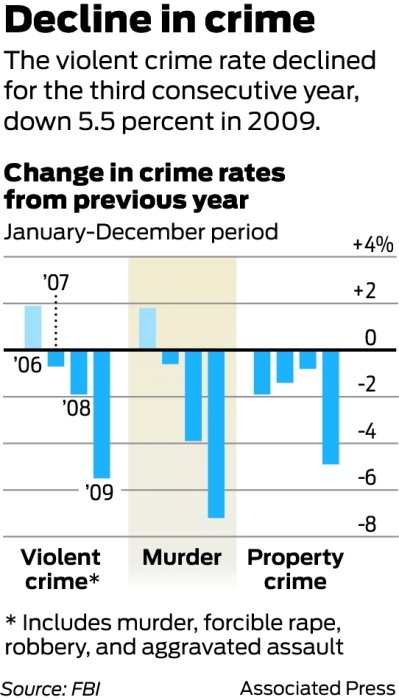Violent Crime is Declining, and Nobody Knows Why
Over a year after emerging from the worst recession in a generation, the United States economy continues to be sluggish, and teeters on the edge of falling into another recession. Despite healthy corporate profits, and private companies sitting on the largest cash reserves they’ve ever had in history, nobody seems to be hiring. The unemployment rate stubbornly refuses to drop below 9%. Just about every reputable economist seems to think that we might as well get used to this, because even in a best-case scenario, things aren’t going to get much better for at least a few years.
The state of political discourse seems to have deteriorated beyond repair, with violent, vitriolic rhetoric directed at one’s political opponents now commonplace. Washington seems unable and/or unwilling to take any real steps to try and turn things around, focused instead on partisan bickering, and playing games of chicken with crucial matters such as the debt ceiling
 People are angry and frustrated. And to make matters worse, nobody seems to know where to direct all this anger. A history student reading this blog post decades from now (the state of history education sure has declined, hasn’t it?) would probably assume that all of this should be accompanied by riots in the street, along with skyrocketing rates of violent and property crime.
People are angry and frustrated. And to make matters worse, nobody seems to know where to direct all this anger. A history student reading this blog post decades from now (the state of history education sure has declined, hasn’t it?) would probably assume that all of this should be accompanied by riots in the street, along with skyrocketing rates of violent and property crime.
But here’s the thing: that hasn’t happened, and nobody has any clue why. In fact, violent crime has been in decline since it peaked in the early 1990s, and the decline from 2009 to 2010 has been particularly notable. Violent crime decreased 13% between 2009 and 2010. This includes crimes that one would expect to increase dramatically during an economic downturn, such as robbery, burglary, and theft.
But even property crimes are down, though to a lesser extent than violent crime.
Many criminologists and sociologists are working hard to figure out why, exactly, this is happening. If it’s the result of some combination of public policies, we obviously want to know what they are, so we can be sure to replicate them.
There are many competing theories about why crime rates are down. One of the simplest is that maybe crime rates don’t correlate with the economy as closely as we’ve previously assumed.
However, a few years ago, one economist offered another extremely fascinating theory, which was extremely controversial for reasons that will soon be obvious. This economist argues that the Supreme Court case of Roe v. Wade, which legalized abortion in the United States, is responsible for reducing the crime rate. Roe was decided in 1973, at which time, the number of abortions performed in the United States increased significantly.
What does this have to with crime rates 20 years later? Well, violent crime began to decline in the early 1990s. This is when children born in the early 70s (when Roe was decided) would be entering young adulthood, which is when most criminals begin their life of crime. Children born into high-crime communities to parents who don’t want them are very likely to turn to crime themselves. It also happens that those pregnancies are the most likely to end in abortion.
So, the theory goes, a significant portion of the generation of potential criminals that would have come of age in the early 90s was never born, as a result of Roe v. Wade. And as the years went on, the effects have simply become more visible, as the number of children born into environments that bread criminality continued to decline. Obviously, this theory has proven extremely controversial, but it is very compelling.
Another idea that some have put forth is that improvements in our ability to diagnose and treat mental illness over the last few decades have made it easier to address behavioral problems shortly after they appear in children. Obviously, if mental illness can be detected and addressed earlier, it’s far less likely to manifest in the form of destructive or antisocial behavior.
And others are arguing that the fact that we are incarcerating more people than just about any country in history has something to do with lower crime rates. It makes perfect intuitive sense that locking up criminals is going to decrease violent crime.
Personally, I think it’s probably a combination of all of these things. Or maybe it’s something that nobody has even considered.
Whatever the cause, it’s very important that we figure out exactly what’s going on. It’s wonderful that crime has continued to decrease for all these years, and if we want to enact policies to ensure that this trend continues, and that crime rates don’t start increasing again, it would be good to know what policies, or other social conditions, are causing crime to decrease.


Comments
The incarceration argument makes some sense. But I’m not sure about abortion. If I assume high crime areas are areas of high poverty, then are the people who live in those places able to afford abortions?